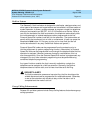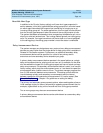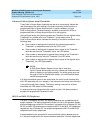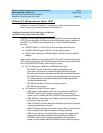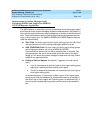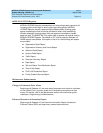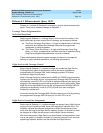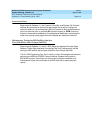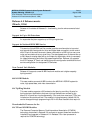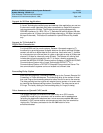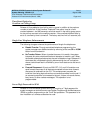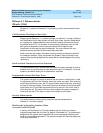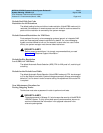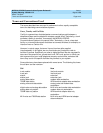
MERLIN LEGENDCommunications System Release 6.1
System Planning
555-661-112
Issue 1
August 1998
Prior Releases: Features and Enhancements
Page xxxiiRelease 4.0 Enhancements (March, 1996)
Release 4.0 Enhancements
(March, 1996) 0
Release 4.0 includes all Release 3.1 functionality, plus the enhancements listed
below.
Support for Up to 200 Extensions 0
An expanded dial plan supports up to 200 tip/ring devices.
Support for National ISDN BRI Service 0
This service (Hybrid/PBX and Key modes) provides an alternative to loop-start
and ground-start lines/trunks for voice and digital data connectivity to the central
office. Each of the two B-channels (
bearer channels
) on a BRI line can carry one
voice and one data call at any given time. The data speeds on a B-channel are up
to 28.8 kbps for analog data and up to 64 kbps for digital data, which is necessary
for videoconferencing and other high-speed applications. Release 4.0 supports
the IOC Package “S” (basic call handling) service configuration and Multiline Hunt
service configuration on designated CO switches.
New Control Unit Modules 0
Release 4.0 supports a new NI-BRI line/trunk module and a higher-capacity
tip/ring module.
800 NI-BRI Module 0
This new module connects NI-BRI trunks to the MERLIN LEGEND system for
voice, high-speed data, and video transmission.
016 Tip/Ring Module 0
This new module supports a 200-extension dial plan by providing 16 ports for
tip/ring devices. Applications that use a tip/ring interface can connect to this
board. All 16 ports can ring simultaneously. Four touch-tone receivers (TTRs) are
included on the module as well. The module’s ringing frequency (default 20 Hz)
can be changed through programming to 25 Hz for those locations that require it.
Downloadable Firmware for the
016 T/R and NI-BRI Modules 0
The Personal Computer Memory Card International Association (PCMCIA)
technology introduced in Release 3.0 continues to support these two boards for
installation and upgrade in Release 4.0. A Release 3.0 or later processor is
required for PCMCIA technology.



